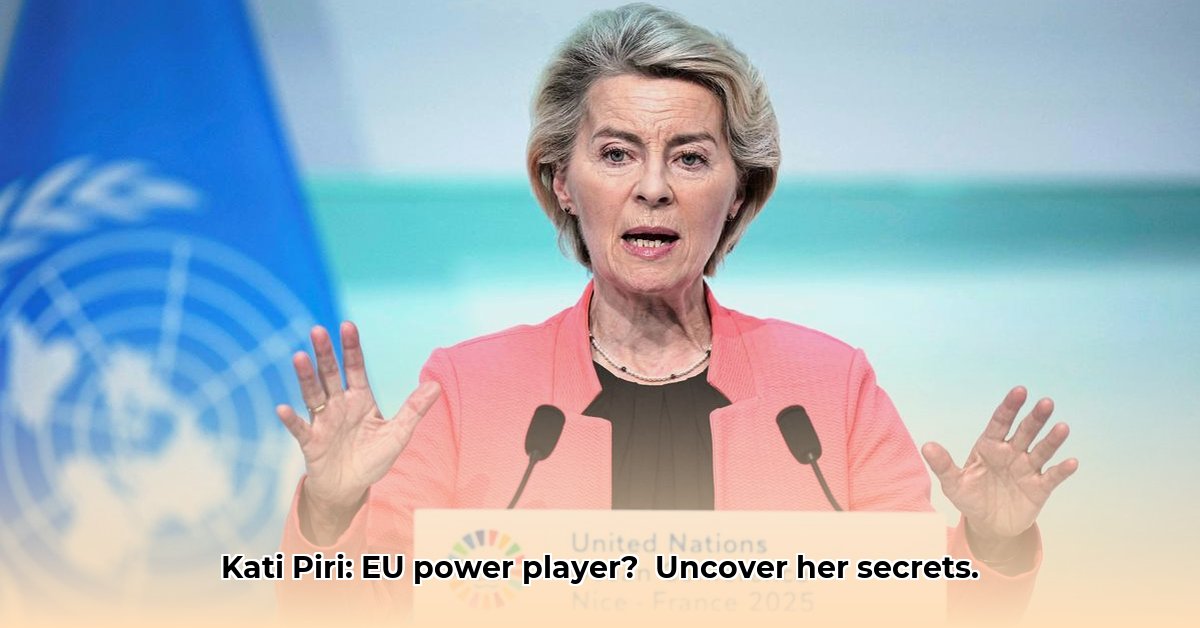
Kati Piri: the name might not be globally recognised, but in the corridors of European and Dutch politics, it carries considerable weight. This isn't just a biography; it's an exploration of her impact, successes, and the controversies that have shaped her career. From her early activism to her current prominent role, we unpack Piri's journey and its profound consequences.
Early Career and Ideological Foundations
While details of Piri's early life remain relatively private, her commitment to progressive values is evident from her early association with the Partij van de Arbeid (PvdA), the Dutch Labour Party. This affiliation reveals her roots in social democracy – a political philosophy emphasising social justice, equality, and workers' rights. The PvdA's history of advocacy for the common good provided fertile ground for her political ambition.
European Parliament Role & Key Achievements/Challenges
Elected as a Member of the European Parliament (MEP), Piri quickly emerged as a significant player. She actively shaped debates and undertook key responsibilities as rapporteur on critical issues, particularly concerning Turkey's EU accession and relations with Eastern European nations. These roles demanded astute diplomacy and a sharp understanding of international relations. The complexities of EU politics, rife with competing interests, led to compromises and arduous negotiations. However, Piri's determination left an undeniable mark on EU foreign policy. The 2016 Turkish coup, for instance, tested her unwavering commitment to human rights, even amidst intense pressure.
The Iron Dome Debate: A Defining Moment
Piri's vocal opposition to the export of Iron Dome components from the Netherlands caused significant controversy. This stance, firmly rooted in her beliefs regarding arms sales and the Israeli-Palestinian conflict, clearly demonstrated her commitment to principles over political expediency. It highlighted the challenging choices politicians face when personal convictions clash with national interests or public opinion. This event cemented her reputation as a strong, opinionated figure willing to take a stand, even when unpopular. Did it harm her career? Possibly. Did it strengthen her convictions and resonate with a dedicated following? Undoubtedly.
Return to Dutch Politics and Coalition Dynamics
Piri's return to Dutch politics, collaborating with GroenLinks and the PvdA, introduced a new set of complexities. Domestic politics demands navigating intricate coalition dynamics and responding to public sentiment. Her role as a spokesperson – dealing with foreign affairs and asylum, often a minefield of competing interests – required a distinct skill set. This move suggests a desire to influence policy at a more granular, national level, showcasing the tangible impact possible in domestic politics.
Assessment of Impact and Future Prospects
Kati Piri's political legacy transcends specific legislative achievements. Her consistent advocacy for human rights and progressive values has sparked dialogues and re-examinations of policy, both nationally and within the EU. Her critiques, often controversial, significantly shaped political discourse and established her as a prominent figure. But what does the future hold? While predictions in politics are risky, her past performance suggests continued engagement with critical issues, promising both further successes and challenges for this impactful politician.
Actionable Intelligence: Potential Impacts (Short-Term and Long-Term)
Piri's continued efforts could lead to:
- Increased public awareness and potential shifts in support or criticism.
- Strengthened internal cooperation within the PvdA/GroenLinks coalition and a unified platform on key issues.
- Continued influence within EU institutions, potentially attaining leadership roles in relevant committees.
- Enhanced engagement with international actors, shaping international policy within the EU framework.
Risk Assessment Matrix
| Risk Category | Likelihood | Impact | Mitigation Strategy |
|---|---|---|---|
| Policy Controversies | Moderate | High | Transparent communication; strategic coalition building. |
| Coalition Dynamics | Moderate | Moderate | Collaborative efforts; skilled negotiation and compromise. |
| Public Perception | Low | Moderate | Consistent messaging; proactive engagement with media and the public. |
| International Relations | Low | High | Strategic partnerships; careful consideration of international sensitivities, |
This assessment is a snapshot, not a definitive prediction. The political climate's fluidity means unforeseen developments could influence the likelihood and impact of these factors.
How Kati Piri's Stances on Israeli Policy Impact Dutch-EU Relations
Kati Piri's strong views on Israeli policy have undeniably shaped Dutch and EU discussions. Her role in motions related to arms sales to Israel has exposed deep political divisions within the Netherlands. Her actions mirror broader EU disagreements regarding its approach to the Israeli-Palestinian conflict. This serves as a case study showing how individual politicians' actions can influence national and international conversations on complex geopolitical issues. The debate surrounding her stances highlights the tension between humanitarian concerns, national security, and strategic alliances. Her actions, while sparking considerable debate, haven't gone unnoticed within the international political sphere.
Conclusion
Kati Piri's political journey is a testament to her unwavering commitment to her principles. Her influence on Dutch and EU politics is undeniable, whether through significant legislative achievements or by igniting crucial dialogues and debates. Her legacy continues to unfold, promising further impact within increasingly complex political landscapes.